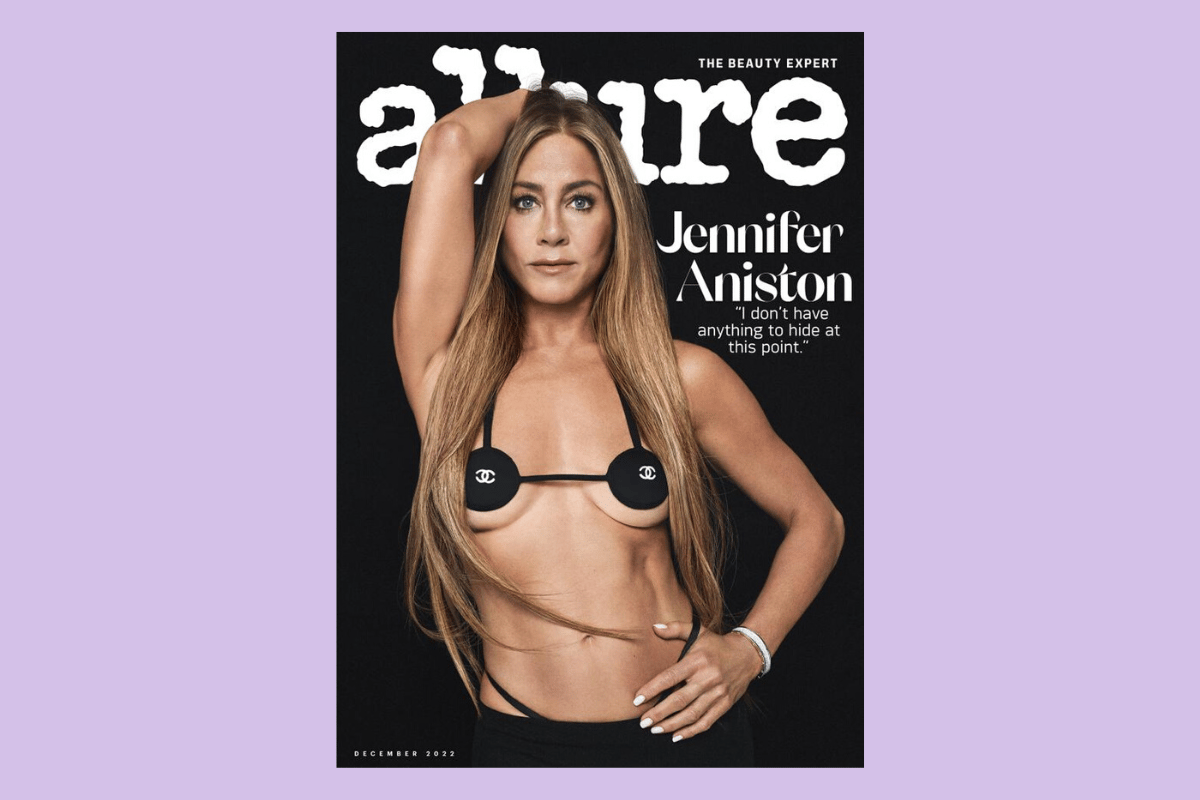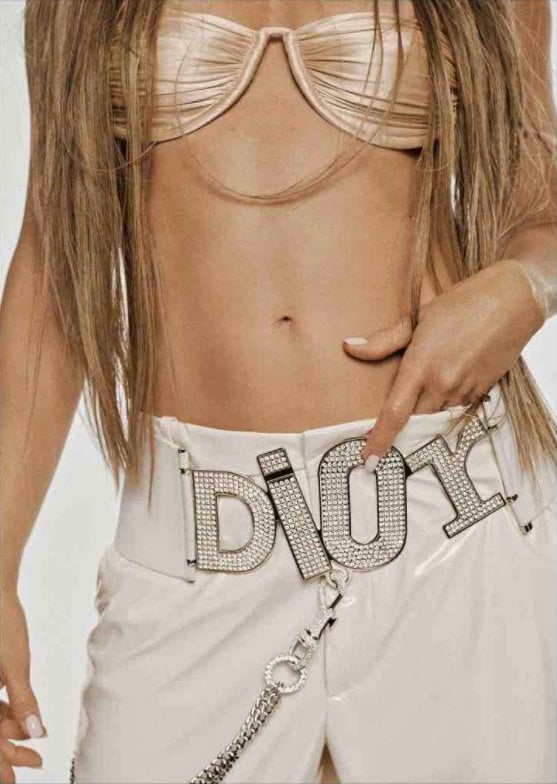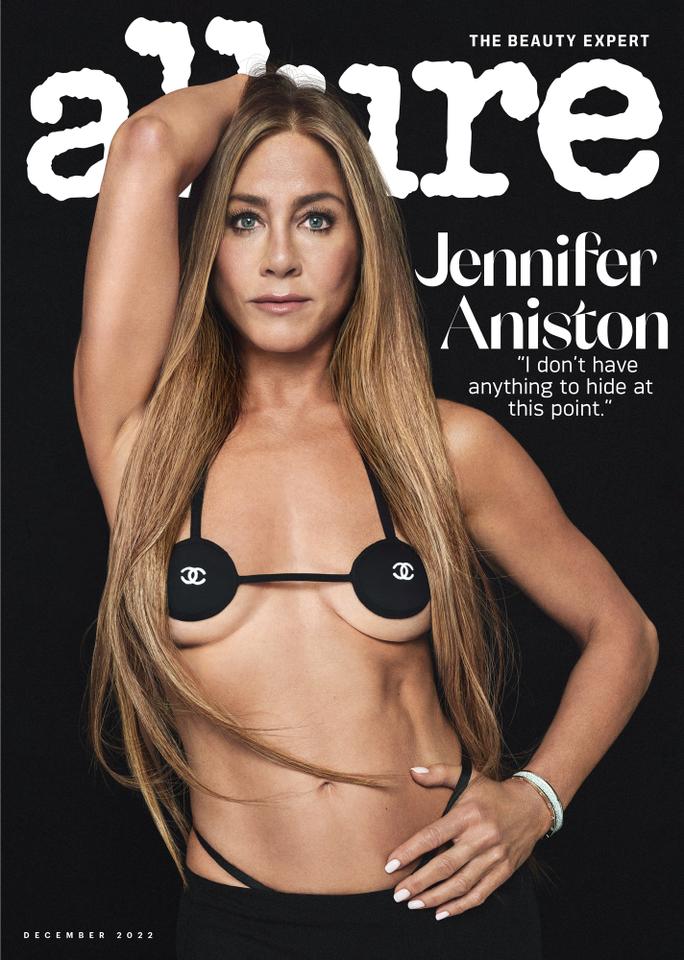
Jennifer Aniston wants you to know that she hasn’t had her 'Last F*ckable Day'.
And before you instinctively accuse me of slut-shaming (I'm not) or dissing women (also not), let me explain.
The 'Last F*ckable Day' is a specific point in a famous woman's life first identified in 2015 by comedian Amy Schumer in a viral sketch on her show, Inside Amy Schumer. Remember it?
Amy stumbles upon a group of actresses in their 40s and 50s who are having an elaborate, lakeside picnic. Julia Luis Dreyfus, Tina Fey and Patricia Arquette are drinking champagne and toasting Julia's Last F*ckable Day. "In every actress's life, the media decides when you finally reach the point when you're not believably f*ckable anymore," Julia explains to Amy as the women prepare the wide-eyed younger actress for the cruel world of middle-aged acting as a woman. Where you're pushed out to sea but your male peers like Tom Cruise and Brad Pitt and George Clooney are still starring in films as romantic leads with female co-stars who are 23.
It's hardly surprising that Jennifer Aniston does not wish to be pushed off to sea. Who would. No woman wants to see opportunities closed off to us because of our age or the way we look. And yet they are. Hence the need to counteract any perceptions about being in your 50s by looking like you're in your 20s.
She may be 53, she may be twice divorced and single and yes, she has been forced to relinquish her motherhood dreams but by God, she’s not ready to go into that danger zone described in the sketch where actresses are no longer considered sexually hot.
We know because Jennifer Aniston is telling us, loud and clear with the photoshoot she's done for Allure Magazine which dutifully ticks every sexually hot box in the long list of oppressive beauty standards for women of every age, that renders a woman 'f*ckable' by our culture (and especially Hollywood) and thus, worthy of attention and validation:
- Wrinkle-free face: tick
- Flat stomach: tick
- Ripped abs: tick
- Flawless, golden skin: tick
- High, perky boobs: tick
- Long, flowing, blonde hair: tick, tick and tick
- Body of a 23-year-old: tick
- Face of a 23-year-old: tick
I'm going to take a wild guess and suggest that if you're still reading, you will now be having one of two thoughts:
1. Yes, I'm so sick of famous women having to constantly take their clothes off at every age to stay relevant. It makes me feel tired.
2. She looks hot and what's your problem with that. This is an appalling example of not supporting women.
Both are valid responses and are likely to be determined by your age. More on that shortly.
First though, we need to get a couple of things out of the way with a quick Q&A I've done with myself.
Q: But why are you criticising a woman for the way she chooses to portray herself? I thought you called yourself a feminist!
A: I’m not (criticising her). I am (a feminist) and I do (call myself one at every opportunity).
Q: You are criticising her though! You’re saying it’s a bad thing that she’s wearing a micro-bikini top and flashing her body. Who are you, the Daily Mail?
A: No, I’m not the Daily Mail. I am a woman with eyes who is looking at the images that Jennifer Aniston has chosen to present to the world and I am translating what she is saying in those images. No judgement. Just eyes.
Q: Why can’t women just wear whatever they want? Isn’t this what feminism is about? Empowering women through their choices which they make to empower themselves? Are you Amish?
A: I’m not currently Amish although a bonnet might have been a more unexpected and interesting choice for one of the world’s most famous women. Of course, all women should be allowed to wear what they want, but this isn’t about defending the rights of women in Iran to uncover their hair. This is about fame and what famous women must do to stay that way. None of us makes choices in a vacuum. And when so many actresses and pop stars choose the same choice, it’s instructive to consider why that might be.
Q: You’re just jealous that your boobs don’t look that perky.
A: That’s not a question, that’s a comment.
Q: OK, here’s a question – do you worry that you sound like a snarky old cow by complaining that another woman looks hotter than you?
A: Ouch. I’ll answer you honestly though. Do I look at those photos and immediately compare my body which is two years younger than hers? Of course. And does that comparison make me feel inadequate and exhausted by the unrelenting message society hurls at women and girls of all ages that our fuckability is our most valued quality if we are as rich, famous and powerful as Jennifer Aniston? Also yes.
Q: You’re the one who is choosing to focus on her body. You’ve written a whole article about it. Don’t you think that makes you a hypocrite?
A: Stop gaslighting me. When an incredibly famous woman chooses to wear Chanel nipple pasties on the cover of a magazine, it is entirely her perogative to do so but don't tell me it's a regular thing for a 53-year-old woman to do because it's not. Therefore, some commentary is invariable and can be done in a constructive, thoughtful way. Also, how can you say her body is not being objectified when in one of the photos her head is literally cut off so you can only see her ripped stomach.
 Image: Allure.
Image: Allure.


Top Comments